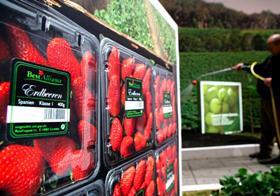
German retailer Rewe Group has outlined plans to expand its Best Alliance contract farming initiative as it seeks to increase the sustainability of its fresh fruit and vegetable procurement operations.
The Cologne-based group announced today that a number of additional fresh produce suppliers were due to join the scheme later this year and in 2010.
'In addition to grapes, strawberries and peppers from Spain and Italy, we now have tomatoes from a Spanish project,' said a spokesman. 'Later this year, citrus from sustainable production managed by Rewe Group and its partners will arrive in the market, while next year the sourcing of grapes from Brazil and Argentina will be expanded.'
Rewe Group is Germany's second-largest food retailer and also operates a number of other supermarket and hypermarket banners across Europe.
The Best Alliance project aims to build on a strategic sourcing partnership signed with leading fresh produce company Univeg Group in order to develop contract farming projects that can secure stable and sustainable volumes of fresh fruit and vegetables for sale through the retailer.
Rewe also announced plans to increase transparency in terms of the level of pesticide residues on its fresh produce.
Together with Global 2000, an independent environmental organisation based in Austria, the retailer reportedly managed to reduce its pesticide usage across the whole group by a quarter.
'Rewe Group aims to reduce this amount further from year to year,' the spokesman added.
Publishing its Annual Sustainability Report for 2008, Rewe said it was also planning to double the amount of solar energy its produces for use across its operations by installing photovoltaic panels on warehouse roofs, for example at new facilities due to be built in Cologne and Baden-Württemberg as well as existing ones in the Czech Republic.
Overall, the company said it expected to increase its solar energy output from 3,500kW to 4,500kW – corresponding to the annual electricity consumption of around 1,250 households and saving an estimated 2,500 tonnes of carbon dioxide every year.






No comments yet